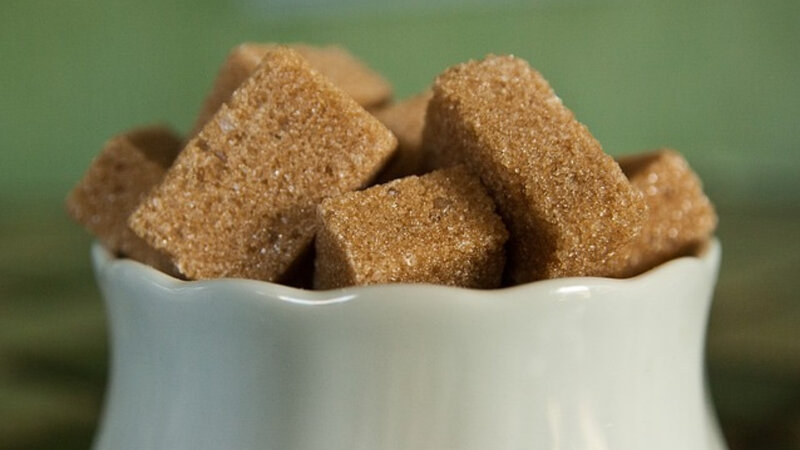Is Brown Sugar Healthier Than White Sugar?
Brown sugar is a food for which there is more confusion or contradictory information going around: is healthier than white sugar?
What is usually sold to us in the supermarket is white sugar disguised as brown? How is it obtained? What is the difference between brown sugar, cane sugar, and whole sugar? Muscovado, turbinado, demerara sugar … how much confusion!
The doubts are many, and we will try to clarify them all in this article where we will talk about the real benefits of brown sugar compared to refined sugar.
What is brown sugar?
Brown sugar is a sugar brown, due to the presence of molasses. It can be an unrefined or partially refined sugar whose crystals have some residual molasses content, or it can be refined white sugar to which molasses has been added later. That is, under the name of brown sugar we can find refined sugar or natural unrefined sugar, two very different things.
Read More: Ketogenic Diet
How do you get brown sugar?
Raw sugar, that is, unrefined, is brown in color. It is produced by extracting the juice from sugar cane, which is then boiled and filtered.
So far we have brown sugar crystals because they contain molasses. These crystals then undergo a clarification and refining process that removes the molasses, producing the white sugar crystals that we all know. Refined sugar can also be obtained from sugar beets; in fact, most of the white sugar we buy is from beets.
Now then, let’s talk about brown sugar … Most of the brown sugar or blond sugar that we find in supermarkets is produced by adding molasses to white sugar. Why is this done? To obtain precise control over the amount of molasses present in the crystals, and above all to reduce costs; This procedure makes it possible to obtain brown sugar from beet sugar, the molasses of which is bitter: then cane molasses is added to the refined sugar from the beet, and the result is a dyed sugar, but completely refined… do you follow us until now?
Brown sugar and whole cane sugar, is it the same?
As you have seen, the answer is no, it is not the same. Under the name of brown sugar, we find on the market a variety of sugars of a more or less dark color, but this does not mean that it is whole sugar, that is, unrefined sugar.
When we say whole grain, as with flour, we mean a food that has not been refined to remove “impurities.” White sugar goes through a chemical purification process, and as a result, a sugar of maximum purity is obtained, with a sucrose content of more than 99%.
The brown sugar cane, ie unrefined brown sugar, is not subjected to refining. Therefore, the molasses contained in the sugarcane juice is part of the crystals, giving them the darkest color. The brown sugar contains between 96 and 98% sucrose.
Read More: How To Grow Hair Faster At Home?
Different types of whole sugar or natural sugar
- Panela: it is obtained through the evaporation and concentration of the sugar cane juices.
- Turbinado: it is partially refined since it is obtained from the crystallization of raw sugar, which is centrifuged to remove water and some impurities.
- Muscovado: the sugar cane extract is heated to thicken it and then evaporated in the sun, crushed to obtain a raw, wet sugar that retains all the natural minerals.
How to know if the sugar we buy is real unrefined brown sugar?
When we go to the supermarket with the intention of buying unrefined cane sugar, we find a lot of products, and many times the information they provide on their packaging is somewhat confusing and misleading; We can do a little experiment at home to find out if the sugar we have bought is real unrefined brown sugar, or it is white sugar with the addition of molasses:
We take a glass of water and add a tablespoon of the sugar, stir and wait. The water will be colored by the molasses, but if the sugar turns white, it means that it is sugar refined with molasses. If instead, it stays brown, it is real whole sugar.
Read More: How To Remove Toxins From Body Home Remedy?
Properties of brown sugar
While it is true that brown sugar contains vitamins, potassium, magnesium, minerals, calcium, iron, and amino acids that are not present in white sugar (because they are lost during the refining process), the amounts of these nutrients are so low that they are negligible from the point of view nutritional. Therefore, the nutritional properties of brown sugar are almost identical to those of refined sugar.
Is brown sugar better than white sugar?
But then, is brown sugar or not better than white sugar? Let’s start by marking the differences between the two:
Differences between brown sugar and white sugar
First of all, clarify that these differences to which we refer are between whole sugar and refined white sugar. As we have seen, the brown sugar that is usually sold in supermarkets as such is nothing more than white sugar to which molasses is added.
- Appearance: In addition to color, whole sugars have a more moist texture.
- Minerals: we have said that whole sugar contains more minerals than refined sugar, but in such a low concentration that we would have to eat a lot of sugar to be relevant for our body.
- Flavor: This is probably the biggest difference between the two types of sugar – the presence of molasses gives the whole sugar a more caramel flavor, somewhat reminiscent of honey.
- Caring for the environment: it is usually ensured that whole sugar is more ecological because it does not undergo the chemical process of refining. In reality, a large part of the production process of the two types of sugar is identical, which has, like any other industrial process, an impact on the environment. If instead, we talk about integral cane sugar from organic agriculture, then we can consider it more respectful of the environment.
Now that we’ve seen the differences, we can assure you: brown sugar is no better for your health than white sugar. In fact, sugar consumption is detrimental to our health, let’s see why:
Read More: How To Do The Virasana? Its Benefits & Precautions To Be Taken
Why you should cut back on sugar
Remember that when we talk about the negative effects of sugar we refer to the consumption of sweetened products, not the natural sugar that foods contain.
- Caries: Excessive sugar consumption causes cavities. This is because sugar feeds the cariogenic bacteria that naturally live in our mouths; These bacteria transform sugar into lactic acid, which attacks tooth enamel.
- Increases the need of vitamin B: foods that naturally contain sugar, also contain the necessary nutrients to absorb it: the B vitamins help digest carbohydrates and transform glucose. These vitamins are present in foods that naturally contain sugar (fruits, vegetables, cereals), but not in refined sugar, which is pure sucrose. That is why our body must use its reserves of vitamin B to metabolize the sugar in foods made with a lot of sugar such as pastries, sweetened beverages, etc.
- Insulin resistance: The pancreas secretes insulin to lower blood sugar levels. This works by converting sugar into fat, thus lowering its level in the blood. Excessive consumption of sugars has been shown to decrease its efficiency; therefore, blood sugar levels rise, which in the long term can cause serious illnesses such as type 2 diabetes; Bad circulation; waterfalls; healing problems; etc.
- Obesity: sugar provides empty calories, that is, calories that do not provide us with any type of nutrients. Let’s take an example: it is not the same to consume 400 Kcal from nuts, which contain antioxidants, minerals, fiber, minerals, and “good” fats, then the same amount of calories from a sugary drink, which gives us only that, calories.
- Addiction: refined sugar is much sweeter than what is naturally contained in food; The taste buds, especially those of children, get used to this intense flavor and lose their pleasure from the natural sweetness of foods such as fruit. In this way, it can happen that the consumption of sugar (chocolates, sweets, industrial juices, soft drinks, etc.) displaces other healthier foods from the diet.
- Cardiovascular disease – Many scientific studies have shown that people who consume a lot of sugar are at increased risk of cardiovascular disease.
Read More: List Of Foods To Avoid During Pregnancy
What do you think? We have talked about each of the doubts that usually arise in relation to brown sugar: now you can choose to know what you are consuming! And remember that the key to good health is a balanced diet: unless you do not have a specific pathology that does not allow you to consume sugar, you can include it in your diet very moderately, reserving its consumption for occasional treats, such as a cake pumpkin.























